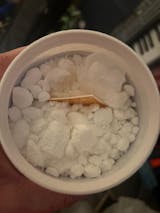
When it comes to pre-workout supplements, one ingredient that stands out is L-Citrulline. But why is L-Citrulline, like that found in the pre-workout WTF, known to increase nitric oxide levels faster than Citrulline Malate? Let's delve into the science behind it.
Understanding the Difference: L-Citrulline vs. Citrulline Malate
L-Citrulline is a non-essential amino acid that plays a crucial role in the urea cycle, which helps the body eliminate ammonia, a waste product of protein metabolism. On the other hand, Citrulline Malate is a combination of L-Citrulline and malic acid.
The Role of Malic Acid
Malic acid, found in Citrulline Malate, needs to be cleaved before the body can absorb the L-Citrulline. This process can slow down the absorption of L-Citrulline and delay its effects on nitric oxide production.
The Advantage of L-Citrulline
On the contrary, L-Citrulline in its pure form does not have the malic acid component, allowing it to be absorbed more quickly by the body. This faster absorption leads to a more rapid increase in nitric oxide levels, enhancing blood flow and nutrient delivery to the muscles during exercise.
Scientific Evidence
Studies have shown that supplementation with L-Citrulline can lead to significant increases in plasma L-arginine levels, which is a precursor to nitric oxide synthesis. This, in turn, can improve exercise performance, reduce fatigue, and enhance recovery.
Conclusion
In conclusion, the absence of malic acid in L-Citrulline allows for faster absorption and utilization of this amino acid, leading to a more rapid increase in nitric oxide levels compared to Citrulline Malate. For those looking to maximize their workout performance and muscle pump, choosing a supplement with pure L-Citrulline like WTF can be a game-changer.

